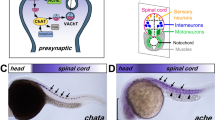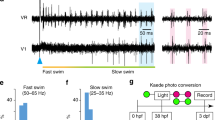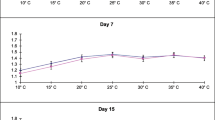Abstract
IT is known that the enzymes needed for the synthesis and the destruction of acetylcholine are present in fish muscle in large amounts1,2, and that certain electric organs, probably derived from muscle, are sensitive to acetylcholine3. It is therefore usually taken for granted that neuromuscular transmission in fish occurs by a cholinergic mechanism, as in other vertebrates, but there is, in fact, little evidence that fish muscle can be activated by acetylcholine, or that acetylcholine is normally released by motor-nerve-endings in fish.
This is a preview of subscription content, access via your institution
Access options
Subscribe to this journal
Receive 51 print issues and online access
$199.00 per year
only $3.90 per issue
Buy this article
- Purchase on Springer Link
- Instant access to full article PDF
Prices may be subject to local taxes which are calculated during checkout
Similar content being viewed by others
References
Augustinsson, K. B., Acta Physiol. Scand., 15, Supp. 52 (1948).
Cohen, M., Arch. Biochem. Biophys., 60, 284 (1956).
Keynes, R. D., “Electric Organs”. In The Physiology of Fishes, 2, edit. by Brown, M. E. (Academic Press, New York).
Author information
Authors and Affiliations
Rights and permissions
About this article
Cite this article
KRNJEVIĆ, K. Cholinergic Transmission in Fish Muscle. Nature 191, 1403–1404 (1961). https://doi.org/10.1038/1911403a0
Issue Date:
DOI: https://doi.org/10.1038/1911403a0
Comments
By submitting a comment you agree to abide by our Terms and Community Guidelines. If you find something abusive or that does not comply with our terms or guidelines please flag it as inappropriate.



